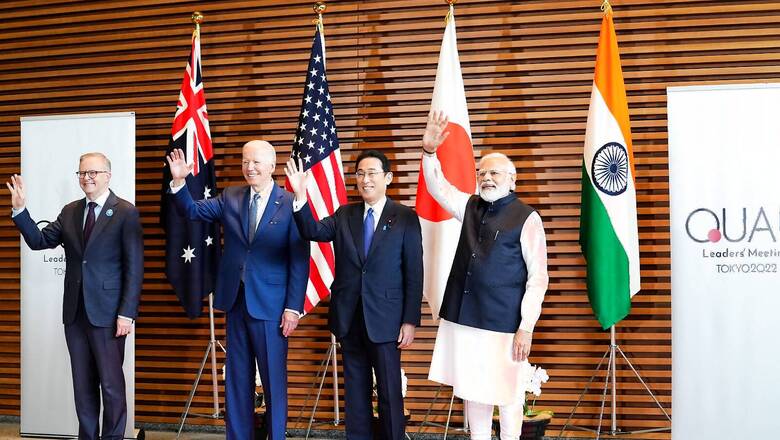
views
Recently, leaders of the four nations – Japan, India, Australia and the US – met for the second in-person Quad Leaders’ Summit. The head of states – Fumio Kishida, Narendra Modi, newly elected Anthony Albanese and Joe Biden – met in Japan to strengthen bilateral ties and discuss pertinent global issues, especially maritime security.
Known as the Quadrilateral Security Dialogue, the Quad is an informal strategic forum with the primary objective of working for a free, open, prosperous and inclusive Indo-Pacific region. Often cited as a grouping of like-minded countries whose strategic interests in the region converge on keeping a check on Chinese expansionism, the grouping has positioned itself as a key player in the Indo-Pacific security architecture over the course of 15 years since its inception.
INDO-PACIFIC MARITIME DOMAIN AWARENESS (IPMDA) INITIATIVE
The Quad announced a maritime domain awareness partnership that will transform the ability of partners in the Pacific Islands, Southeast Asia and the Indian Ocean region to monitor the waters on their coasts in order to maintain a free and open Indo-Pacific. The flagship initiative, though not explicitly targeted at a particular nation, is expected to enormously affect China, the nation termed as the leading offender in the 2021 IUU Fishing Index for its unreported, unregulated and illegal fishing practices.
Member countries will be able to monitor illegal fishing, track “dark shipping” and other tactical activities through the initiative. A dark ship is one whose Automatic Identification System (AIS) is switched off so as not to get detected. The Chinese fishermen who conduct illegal fishing are accused of indulging in this practice. There will be a strengthening of the Indo-Pacific region’s security apparatus due to this crucial maritime agreement between the Quad member countries. To track illegal fishing from the Indian Ocean and Southeast Asia to the South Pacific, satellite technology will be used to connect existing surveillance centres in Singapore, India and the Pacific region.
Commercial satellites will gather a new stream of data for use by countries across the Indo-Pacific region. As this data will have a commercial origin, it will be unclassified, giving the Quad an opportunity to provide it to a wide range of partners. By providing smaller regional partners with a near-real-time, integrated and cost-effective maritime domain awareness information, the initiative truly highlights the Quad’s vision of an open, free and prosperous Indo-Pacific for all. According to Zack Cooper, a senior fellow at the American Enterprise Institute, “If properly executed, this effort could be a flagship project for demonstrating the Quad’s value to regional countries.”
Over the years, the nations in Indo-Pacific have hoped for a more united and hands-on effort by the grouping to address the needs of smaller states in the region, particularly the issue of illicit maritime activity, typically conducted by Beijing. If steered correctly, the initiative can revolutionise maritime security.
POSITIONING QUAD IN INDO-PACIFIC MARITIME SECURITY ARCHITECTURE
The idea of a multilateral grouping like Quad took birth in the aftermath of the 2004 tsunami and was formalised after Japanese Prime Minister Shinzo Abe’s famous “Confluence of the Seas” speech in 2007 that conceptualised a new geographical theatre, the Indo-Pacific. However, the four countries were not on the same page when it came to threats facing the region at the time. It wasn’t until 2017 that the group came back to life.
What rebooted the grouping was the “Chinese threat”. The grouping, in terms of International Relations theory, is a product of ‘external balancing’. The revival of Quad runs parallel with the rise of China in the region, especially in the maritime domain, where all the four nations have substantial economic interest and thus require the strategic sea routes in the Indo-Pacific to remain free of any military or political influence.
Before one attempts to position Quad in the maritime security architecture, it is important to define “maritime security”. While there exists no globally accepted definition of this new catchword, it can be broadly conceptualised as the absence of ‘maritime threats’ such as maritime inter-state disputes, maritime terrorism, piracy, trafficking, arms proliferation, illegal fishing, environmental crimes, or maritime accidents and disasters.
While the grouping began as an informal dialogue, over time, it has become more involved and dynamic, given the deplorable condition of a rules-based order in the Indo-Pacific. Moreover, the strategic dimension of the Quad has gained greater relevance and traction. Australia joining the United States and Japan in the India-led Malabar Naval Exercise (2020) was a major turning point in the grouping’s history. It marked the grouping’s first such joint military exercise and cemented their commitment towards providing security in the region. As a result, they are enjoying unprecedented levels of information and intelligence exchanges, personnel interactions, interoperable equipment and cooperative habits. The four nations also have extensive bilateral logistics agreements in place resulting in better interoperability between their navies and increased capability to provide security in the region.
While the Malabar exercise marked a significant step toward increased maritime cooperation between the four members, a need was felt for a more robust mechanism to ensure maritime security amidst the increasing cases of illegal fishing, human and weapons trafficking and piracy that threaten the important sea lines of communication in the region.
Chief of Naval Staff Admiral R. Hari Kumar in April 2022 said that it is almost impossible for any one country to ensure maritime security in the current context and like-minded countries must join hands to deal with the evolving challenges. An initiative like IPMDA provides the perfect opportunity to stand up, come together and face the challenge.
WHAT INDIA STANDS TO GAIN
The IPMDA initiative is of particular importance to India due to its ambition of becoming a “Net Security Provider” in the region. India’s geographic and geopolitical centrality in Indo-Pacific positions it as the perfect candidate for the role. Indian Navy, in 2018, established the Information Fusion Centre-Indian Ocean Region (IFC-IOR) for regional collaboration on maritime security issues. IPMDA furthers India’s geopolitical ambitions in the region – to move beyond the ‘middle power’ status and join the league of great powers, foster closer strategic relationships with key players in the region, and enhance our ability of power projection in distant seas.
Time had come when the Quad nations felt the need for a more robust regional security architecture, and they acted on it. What becomes of the initiative is something that only time will tell, but this is one of the most promising initiatives by the grouping to date. In the words of Joe Biden, Quad isn’t just a passing fad, it means business.
ALSO READ | With China Back on USA’s Radar, the Quad is on Track With Renewed Vigour
Esha Banerji specialises in Defence and Strategic Studies at the Savitribai Phule Pune University. The views expressed in this article are those of the author and do not represent the stand of this publication.
Read all the Latest Opinions here



















Comments
0 comment